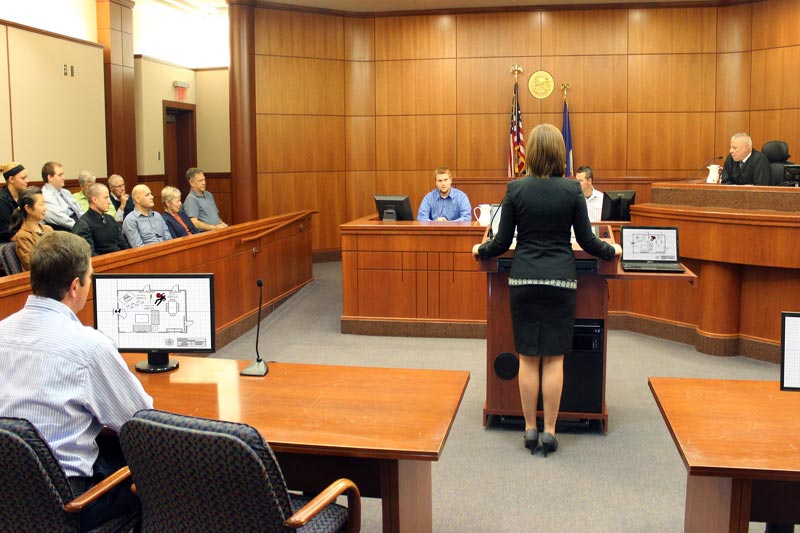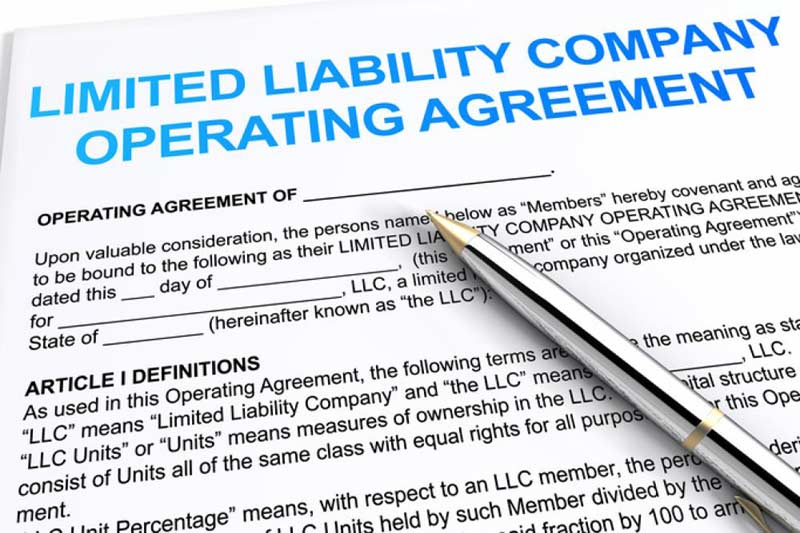What Happens If You Have Been Called Up For Jury Duty

One of the cornerstones of any democracy is its criminal justice system, and more importantly, the rights of anyone accused of a crime.
They have the right to a fair trial, and to be represented by a criminal lawyer, to name but two of those rights.
Read FullIndividual Trustee vs Corporate Trustee – Which Is The Best Option?

One of the means by which businesses and individuals can protect their assets and secure several tax benefits is the use of trusts, however, the entire process must be done correctly, which is why commercial lawyers are essential due to their knowledge and experience in helping to set up trusts and ensuring they are fully compliant with the prevailing legislation.
One choice that has to be made concerning trusts is how they are to be managed, and this normally boils down to choosing whether a corporate trustee or an individual trustee is to carry out that role. Each of these choices differs in several ways which has implications for trust beneficiaries so we thought it would be useful to outline some of the relevant facts.
The Four Important Roles Relating To Trusts
Whenever a trust is created, there are normally four entities that play a key role in its creation and management. These four key players are:
Appointor: The appointor has the right to nominate trustees and also remove them should it be deemed necessary. This means that in terms of whether an individual or corporate trustee is appointed, it is within their power. When the trust is being created for an individual it is usually them who has the role of appointer.
Read FullWhy Family Courts Have Plenty to Say About Drug Use

It might surprise some of you reading this to know too many of the people who go through drug rehab, including when that takes place in a residential facility, are much-loved family members, many of whom are fathers or mothers of young children. This points us to the fact that drug addiction makes no distinction of who is afflicts, so it can impact anyone regardless of age, gender, income bracket, or the family they belong to.
Whilst drug rehab should be seen as a positive step in someone moving towards freeing themselves of drug addiction, it can also form part of a situation directed by decisions taken under family law. Bear in mind that many cases before the Family Court are either complicated by or initiated due to someone being addicted to drugs.
Drug laws, which come under the umbrella of criminal law and family law, are two distinct legal areas, so lawyers specialise in each. Nevertheless, there will be instances where their paths cross, especially when children in a family are affected. Therefore, we will take a brief look at how the Family Court will make rulings when drug use and drug addiction are a factor.
Read FullWhat Does Presumption Of Parentage Mean In Family Law?

Many of the key matters of the cases that come before the Family Court relate to children and by extension the parents of those children. In the majority of these cases there is no ambiguity as to who the parents of those children are, however, many family lawyers are involved in cases where the parentage of a child is disputed.
By disputed, it can either be the case that someone who the mother claims is the father and therefore has responsibilities to the child including financial ones, disputes her claim. In effect, they are saying that they are not the father, and thus any parental or financial responsibilities for the child are not his.
Conversely, it could be that someone who believes they are the father of a child and wishes to have contact with them has their claim disputed by the child’s mother, who states that someone else is the child’s father.
Read FullFive Reasons You Should Speak With a Family Lawyer About Child Custody

Child custody arrangements can be complicated, especially if they need to be organized during a tough separation. In many cases, child custody arrangements will be dealt with by the courts, carefully outlined, and will need to be followed closely.
However, child custody arrangements won’t always work in your favour. Because of this, it’s very important to think carefully about hiring a family lawyer to help you argue your case. Even if you don’t end up in court, child custody is still a complicated thing to agree on, and a lawyer will be able to streamline the process.
Below are our top five reasons why you should speak with a lawyer about child custody. They include:
- They Will Help Streamline the Process
Child custody cases generally take some time to work through, and they can become complicated and stressful for your children and you. Having the support of a family lawyer specializing in child custody disputes will ensure things are as easy as possible for you. For example, a lawyer will be able to help you argue your case with regards to why you should get custody or joint custody of your children, giving you a much higher chance of winning.
Read FullFive Reasons Why You Should Use an Employment Lawyer

As an employer, it can be hard to make sure that you’re following the necessary rules and regulations, especially if you’re running a large business. As an employee, understanding your rights in the workplace can be complicated. Fortunately, that’s where employment lawyers come into play.
There are numerous benefits associated with using an employment lawyer, especially if you’re not familiar with the more complex workplace laws. Although lawyers can be expensive, using one could save you a lot of money on future lawsuits and large-scale payouts/settlements – or, on the other hand, help you win harassment or discrimination cases.
With this in mind, we’ve put together a list of our top five reasons why you should use an employment lawyer. They include:
Ensuring Contracts and Other Legal Documents Are Well-Written
As an employer, it’s crucial to ensure all contracts and other legal documents are correctly written. If they aren’t, they could contain loopholes or inconsistencies that will get you in trouble in the future.
We’d highly recommend using an employment lawyer every time you need to write or review contracts and other documents, regardless of their complexity. If your business is large enough, it could even be worth adding a lawyer to your team on a full or part-time basis.
Read FullWhat Happens When You Breach A VRO?

Violence restraining orders, or VROs, are one of the most common legal issues dealt with by criminal lawyers and legal advisors in Australia. VROs may be imposed by a legal authority, and they put restrictions on where a person bound by the order can go and what they can do. Advice out today says that a VRO will prevent an offender from coming into contact with the person or people who have taken the order out against them. In come cases, they may also be prevented from going to certain places to reduce the risk of contact.
Are Violence Restraining Orders The Same As Criminal Charges?
To put it simply, no, a VRO is not a criminal charge. It won’t go on your criminal record, and won’t leave a permanent black mark against your name. However, breaching a VRO is a severe offence, and will result in a criminal record. The penalties for breaching a VRO can be significant, and include up to $6000 fine and two years imprisonment. Other penalties can be imposed by a court, and repeat offenders can face larger fines or longer prison sentences.
Read FullAt What Age Can A Child Decide Who To Live With In Australia?

The separation of parents of caregivers can happen for a number of reasons.
In many cases, compounding issues arise which can result in the breakdown of a marriage or relationship, leaving parents separated and children stuck in the lurch.
Read FullLegal Websites: 5 Simple Ways To Build Backlinks

Search Engine Optimisation (SEO) is an extremely important part of any digital strategy. However, it is possibly more important for lawyers and law firms than for most other small online businesses. Things like Google AdWords and search engine marketing are less effective for lawyers, which means that a lot of the digital marketing emphasis is placed on SEO.
SEO has a range of different components. Onpage SEO includes things like keyword placement and image optimisation, while offpage SEO includes things like social media use and backlink building. Backlinks are one of the most important SEO ranking factors, and are going to be the focus of this article.
What are backlinks?
Backlinks are a relatively new thing which most of the major search engines now use as a major ranking factor. A backlink can be defined as any website that links back to your site. Backlinks come in a wide range of formats, but the most common is probably within blog posts and website content.
Read FullUnderstanding Your Super Obligations As An Employer

As a business owner, employing your first staff member and paying your first wages can be a daunting prospect. While a lot of people choose to use registered accountants to get themselves started, you really don’t need to. As long as you follow the instructions set out by the Australian Tax Office (ATO), paying your first wages is a relatively simple process.
Accountants Perth advise however, you do need to be aware of your superannuation obligations. Unfortunately, a lot of employers make mistakes when it comes to paying super, and these mistakes can end up costing a lot of money in ATO fines and penalties.
So, what are my super obligations?
We recommend you check with your lawyer because as an employer in Australia, you usually need to make super payments for all employees who are 18 or older, and who earn at least $450 per month. This isn’t a hard and fast rule, so make sure that you do your research to find out what is appropriate for your circumstances. If you are confused, a simple phone call to the ATO can help you figure things out.
Currently, you have to pay a super contribution of 9.5% of an employee’s earnings into their nominated super fund. Note from Financial Planner Perth, that you can’t deduct super contributions from an employee’s wage – they are additional payments above and on top of their normal hourly rate.
If you don’t already know where your employees want you to pay their super to, make sure that you ask them for their account details. If they don’t have an existing super fund, you will need to open an account for them in a basic fund, and pay their contributions into that. Payments have to be made at regular intervals – usually quarterly – and must be made before the due date to avoid financial penalties.
Read FullTop 3 Social Media Platforms For Lawyers And Law Firms

Social media is a valuable marketing tool for law firms and lawyers throughout the world. When used right, it can result in incredible exposure for your firm, driving new clients to your website. It can also help boost your search engine rankings, thus driving more people to your site from organic Google searches.
If your law firm doesn’t already have at least some sort of social media presence, you need to make changes. You should be active on at least one or two platforms, and you should be posting and engaging with your followers on a daily basis if possible. To help you get started, I’ve put together a short list of the top 3 social media platforms for lawyers and law firms. They include:
Facebook is a must. A huge percentage of the world’s population is active on Facebook, which means that it is definitely the best social media platform for exposure and getting your name out there. In fact, a recent study estimated that over 70% of 30-49 year olds who are connected to the internet use Facebook. You would be stupid if you didn’t make the most of this.
Read FullDigital Forensics for Lawyers – The Electronic Commandments

What is forensic evidence in a criminal matter. It’s a near certainty in today’s mobile culture that your criminal lawyer will need to deal with traces of digital evidence somewhere in your criminal case. In cases where information is hidden, erased or altered in some way forensics allows us to discover more information, to draw additional conclusions about existing evidence and even find new material.
It’s important to know where to find the digital bread crumbs. Each day new locations for data are created, new methods of communication, new programs designed to store, encrypt, or automatically erase critical information are deployed. But where should you look? It’s important to have a checklist that is growing all the time but includes at least the following:
- Computers: Servers, Laptops, Desktop Computers, and Tablets
- ISPs (Internet Service Providers). Comcast, Viacom, etc.
- Cell Phones: Smart phones, iPhones, Android devices, Blackberries (yes, they are still in use)
- Tablets: Android, iOS (iPads)
- Wearables: Android glasses, Google glasses, smart watches, fitness tracking devices (e.g. fitbit)
- Cloud providers: iCloud accounts, Google docs, Dropbox, Windows Live, Social Media (LinkedIn, Facebook, Twitter, Snapchat, etc.)
- Emails: Computer-based, mobile devices, cloud based (Gmail, etc.)
Forensic evidence may even be available from “old school” technology such as
Read FullParenting Plans – How to Negotiate and How to Draft

Creating an effective parenting plan in a divorce takes forethought and a solid understanding of family law to know what make up a good plan. Some preliminary thoughts to consider are:
- Choosing: Most courts uphold a biological parent’s right to raise their child as he/she sees fit. This isn’t an unlimited right since there are obviously life choices and lifestyles that could be harmful to a child, which is why #2 is so important.
- Interests of the Child: The overriding criteria most courts will use when examining a parenting plan are the “best interests of the child.” Different jurisdictions have their own standards, but there is amazing commonality among most courts:
- The mental and physical health of the child
- The mental and physical health of the parents
- Parents’ ability to adequately address the needs of the child.
- The thoughts, feelings and reasonable preferences of the child, based on their age and level of maturity.
- Stability in the home environment
- Siblings or other children whose custody and circumstances are relevant to the child.
- The child’s school and adjustment to their community
- Any history of abuse or domestic violence in the home
- Any history of drug abuse or alcohol abuse.
What Happens To My Super If I Get Divorced?

Divorces can get messy lawyers tell us especially if you’re getting separated because of a major falling out with your partner.
Unfortunately, there are a lot of things that you need to think about when it comes to divorces or separations, including the way in which your finances and assets are split.
Read FullTransgender Persons and the Law

A host of issues face transgender persons when trying to obtain fair access to the legal system. Some of the most important concerns are:
- Cost
- Inexperienced legal counsel due to lack of education or familiarity with transgender issues
- Distrust of those unfamiliar with transgender issues
- Attorneys who reject transgender cases
- Unfriendly or hostile court or law enforcement environments
- Unacceptable paperwork or administrative hurdles
- Some services may require the disclosure of the transgender status
How can attorneys make their offices a safe place for transgender persons. Here are a few ideas: Make sure your office is a non-discriminatory environment. Make sure to include gender identity and sexual orientation in your official non-discrimination policy. Be careful with pronouns and issues surrounding transition.
Make sure your restroom are non-gendered and available to your transgender clients but do not “require” that transgender persons use them. Have a policy that allows trans people to use the gendered bathroom of their choice and educate staff and about your restroom policies. Be accommodating but don’t make assumptions when providing directions or keys to restrooms.
Read FullWhy Do I Need A Will?

In short, yes – everyone who has any assets should have a will that outlines what will happen to these assets in the event of your passing away. Having a high quality will can help avoid family disputes, can help avoid losing your estate’s value to court costs and will help your friends and family deal with your passing.
Drafting a high quality, comprehensive will can be difficult if you have significant assets. Unless you have a comprehensive knowledge of Australian wills and the legal system, you should consider employing a family lawyer to help you draft your will to make sure that you don’t miss anything important.
Unfortunately, a lot of people don’t believe that they need a will. Even if you’re young and in good health, you could fall victim to an accident at any moment. Everyone needs a will, and here’s why:
- Having a will makes sure you’re assets are dealt with the way you wish
If you don’t have a will in place, people may fight over who is entitled to what assets and parts of your estate. However, a high quality will drafted with the assistance of a legal professional will make sure that your estate can be settled fast and efficiently.
- Your family won’t fight
If your will clearly states what you’ve left to who, there’s little room for argument. Since wills are legally binding documents, clearly specifying what you want to leave to who will reduce the risk of family breakdowns or fights over your assets.
Read FullThe Ten Commandments (of Cross) – Are They Still Good In Criminal Cases?

Famed prosecutor, criminal lawyer attorney, civil litigator and judge Irving Younger is well known for his “Ten Commandments of Cross Examination”. Lauded as some of the best advice ever for trial lawyers, are these rules to live by still valid for today’s modern courtroom?
Let’s take a look:
- Commandment 1: Be brief. Jurors are notoriously “short-memoried” and to have an impactful cross examination the jurors must remember the questions asked. Imagine the juror as a “cup” with a limited capacity to remember, if you overfill it, the juror will not remember whatever had drained down the side and spilled on the counter. Keep cross brief and impactful.
- Commandment 2: Short and Plain. In other words, jurors respond to short questions and simple language, lawyers do themselves no good using $64 words in long paragraphs. Talk like a real person and “real” people will understand you. The lawyer wants to convey that he may be an attorney, but deep down he’s the same as the juror, just a regular person.
- Commandment 3: Lead me, period. Lawyers should only ask leading questions on cross, they should try to put words into the witness’s mouth, to essentially testify for them. Never let the answer to one of your questions be anything more than “yes” or “no”.
Drafting Asset Purchase Agreements

Acquisitions can be effected in various ways. It may be best to structure the acquisition as an asset purchase, a stock purchase, a stock purchase treated as an asset purchase for tax purposes, or a merger. This article focuses on drafting asset acquisitions.
Clarity is key. Conciseness helps. Lawyers must pay special attention in providing clear descriptions of the following: (1) purchase price; (2) purchase price adjustments; (3) included assets; (4) excluded assets, (5) assumed liabilities; (6) excluded liabilities; (7) seller’s representations and warranties on the physical condition of assets and the financial condition of the related business; (8) the parties’ pre-closing covenants [commitments] and negative covenants [prohibitions]; (9) the parties’ post-closing covenants and negative covenants; (10) indemnification by seller and buyer; (11) conditions to closing; and (12) remedies for breach.
Most relatively complicated asset purchase agreements place the definitions of terms at the front of the document following the recitals that provide the background of the transaction. Some practitioners prefer to place the definitions at the end of the document. In general, the more complicated the transaction, the more important the definitions. A term may be defined in an uncommon way. Reference to the precise definition is the only way to make sense of the body of the agreement. Placing the definitions front and center emphasizes their importance. A novice who reads the body of the agreement before referring to the definitions may be in for a rude awakening.
Read Full